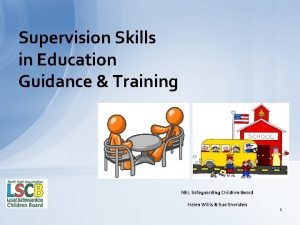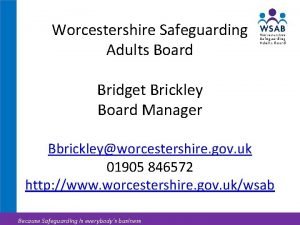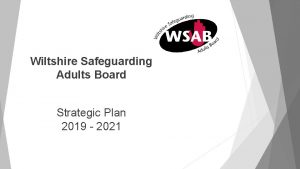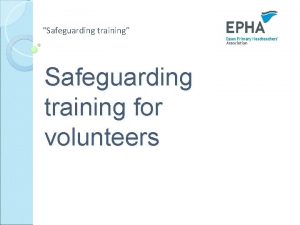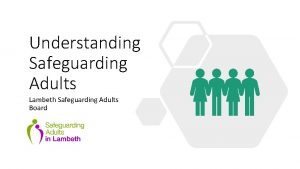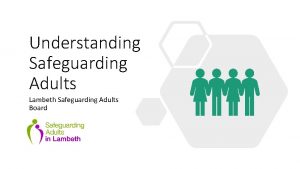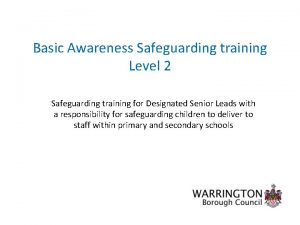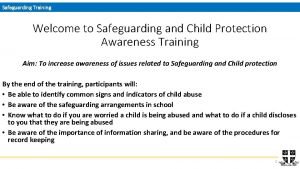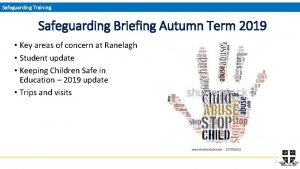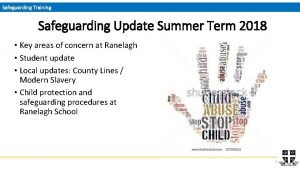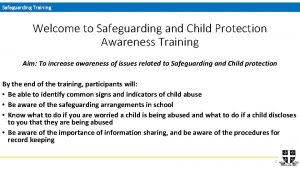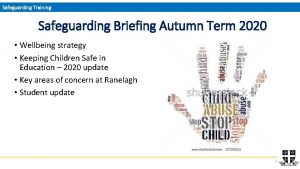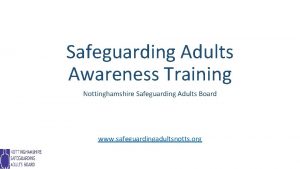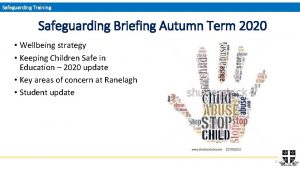Safeguarding Training What is safeguarding Safeguarding is the
















- Slides: 16

Safeguarding Training


What is safeguarding? • Safeguarding is the action that is taken to promote the welfare of children and protect them from harm. • Safeguarding means: protecting children from abuse and maltreatment. preventing harm to children's health or development. ensuring children grow up with the provision of safe and effective care.

Designated Members of Staff within WCHS • Laura Quilter • Alison Shields • Julie Fisher

Types of Abuse • Physical • Emotional • Neglect • Sexual • Cyber

Definitions Physical abuse • Physical abuse is the causing of physical harm to a child or young person. Physical abuse may involve hitting, shaking, throwing, poisoning, burning or scalding, drowning or suffocating. Physical harm may also be caused when a parent or carer feigns the symptoms of, or deliberately causes, ill health to a child they are looking after.

Definitions ctd: Emotional abuse • Emotional abuse is persistent emotional neglect or ill treatment that has severe and persistent adverse effects on a child’s emotional development. It may involve conveying to a child that they are worthless or unloved, inadequate or valued only insofar as they meet the needs of another person. It may involve the imposition of age- or developmentally-inappropriate expectations on a child. It may involve causing children to feel frightened or in danger, or exploiting or corrupting children. Some level of emotional abuse is present in all types of ill treatment of a child; it can also occur independently of other forms of abuse.

Definitions ctd • Sexual abuse is any act that involves the child in any activity for the sexual gratification of another person, whether or not it is claimed that the child either consented or assented. Sexual abuse involves forcing or enticing a child to take part in sexual activities, whether or not the child is aware of what is happening. The activities may involve physical contact, including penetrative or nonpenetrative acts. They may include non-contact activities, such as involving children in looking at, or in the production of, pornographic material or in watching sexual activities, using sexual language towards a child or encouraging children to behave in sexually inappropriate ways.

Definitions ctd: Neglect • Neglect is the persistent failure to meet a child’s basic physical and/or psychological needs, likely to result in the serious impairment of the child’s health or development. It may involve a parent or carer failing to provide adequate food, shelter and clothing, to protect a child from physical harm or danger, or to ensure access to appropriate medical care or treatment. It may also include neglect of, or failure to respond to, a child’s basic emotional needs. Neglect may also result in the child being diagnosed as suffering from “non-organic failure to thrive” , where they have significantly failed to reach normal weight and growth or development milestones and where physical and genetic reasons have been medically eliminated. In its extreme form children can be at serious risk from the effects of malnutrition, lack of nurturing and stimulation.

Behaviours of a Young Leaders must: • maintain appropriate boundaries • avoid improper contact or relationships with pupils they lead • avoid situations within and outwith the classroom which could call into question their suitability to be a young leader • maintain an awareness that as a teacher they are in a position of trust and are role models to pupils.

Relationship with Pupils You should: • appreciate that the onus is upon the you as the young leader and not the pupil to distance themselves from any potentially inappropriate situation • avoid sexual contact with or remarks towards a pupil regardless of the age of pupil or apparent consent of the pupil • not discuss their own private and personal relationships with pupils • avoid becoming personally involved in pupils’ personal affairs

Relationship with Pupils Young leaders should: • always maintain a formal, courteous and polite tone in communicating with pupils. • not exchange private text, phone numbers, personal email addresses or photos of a personal nature with pupils • Avoid communicating with pupils via social media

Relationships with Pupils Young leaders must: • be aware of the potential dangers of being alone with a pupil in a private or isolated situation • not by any means or in any circumstance make, view or access illegal or inappropriate images of children • Avoid inappropriate communication with individuals with whom you may be in a position of trust

Relationships with other leaders You should: • guard against inappropriate banter or practical jokes which are, or could be perceived as being behaviour of an inappropriate nature

Responsibilities towards Pupils • The protection of children and young people is of the utmost importance. A young leader cannot ignore the behaviour of any colleague which they may genuinely feel falls short of child protection norms and standards. Such concerns should be raised with your teacher who will in turn contact the DMS

Your responsibility Tell your teacher
 Safeguarding supervision training
Safeguarding supervision training Worcestershire safeguarding adults board
Worcestershire safeguarding adults board Wiltshire safeguarding team
Wiltshire safeguarding team Các châu lục và đại dương trên thế giới
Các châu lục và đại dương trên thế giới Dot
Dot Thế nào là sự mỏi cơ
Thế nào là sự mỏi cơ Bổ thể
Bổ thể độ dài liên kết
độ dài liên kết Thiếu nhi thế giới liên hoan
Thiếu nhi thế giới liên hoan điện thế nghỉ
điện thế nghỉ Tia chieu sa te
Tia chieu sa te Hát lên người ơi alleluia
Hát lên người ơi alleluia Một số thể thơ truyền thống
Một số thể thơ truyền thống Sơ đồ cơ thể người
Sơ đồ cơ thể người Công của trọng lực
Công của trọng lực Số nguyên tố là số gì
Số nguyên tố là số gì đặc điểm cơ thể của người tối cổ
đặc điểm cơ thể của người tối cổ
